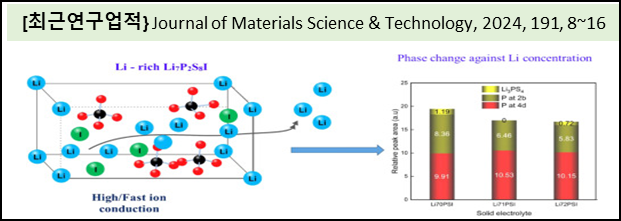|
Title |
Enhanced lithium dendrite suppression ability through SiO2 substitution in superionic halogen-rich argyrodites and their application in all-solid-state lithium batteries |
|
Author list |
Rajesh Rajagopal, Yuvaraj Subramanian, Sung Kang, Kwang-Sun Ryu |
|
Publication date |
2024/08 |
|
Citation information |
Journal of Materials Science & Technology, 2024, 191, 8~16 |
|
Abbreviation of Journal Name |
Journal of Materials Science & Technology |
|
DOI |
10.1016/j.jmst.2023.12.038 |
|
Graphical Abstract
(Do not change the size of box, and also do not remove the citation information.) |
 |
|
Abstract
(superscript and subscript cannot be allowed.) |
Li2S-P2S5-type inorganic solid electrolytes with cation and/or anion doping are considered to be promising candidates for all-solid-state batteries (ASSBs), due to their high ionic conductivity and electrochemical performances. However, compositional tuning of Li2S-P2S5 type inorganic solid electrolytes without doping has not been fully studied. In this work, Li-rich Li7P2S8I solid electrolyte was prepared with compositional tuning by high energy ball mill process. The crystalline nature and the structural characteristics of the prepared solid electrolytes were studied with several physiochemical techniques. The effect of compositional tuning and the associated limitations were analyzed by laser Raman spectroscopy and solid-nuclear magnetic resonance spectroscopy (NMR) analysis techniques. The prepared Li-rich Li7P2S8I solid electrolyte exhibited higher ionic conductivity (6.27 mS cm–1) than the bare Li7P2S8I solid electrolyte (5.16 mS cm–1). Further, the prepared Li7.1P2S8.1I0.9 solid electrolyte is highly stable against lithium metal anode and is stable up to 600 charge-discharge cycles. Thus, the fabricated ASSB using Li-rich Li7P2S8I solid electrolyte exhibited excellent cycle stability of 97% specific capacity retention with less interfacial reaction. Electrochemical impedance spectroscopy and the laser Raman spectroscopy analysis after galvanostatic charge-discharge cycling confirmed the electrochemical stability of Li-rich Li7P2S8I solid electrolyte. |

